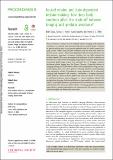Files in this item
Beaked whales and state-dependent decision-making : how does body condition affect the trade-off between foraging and predator avoidance?
Item metadata
| dc.contributor.author | Siegal, Eilidh | |
| dc.contributor.author | Hooker, Sascha Kate | |
| dc.contributor.author | Isojunno, Saana | |
| dc.contributor.author | Miller, Patrick James | |
| dc.date.accessioned | 2022-01-26T11:30:11Z | |
| dc.date.available | 2022-01-26T11:30:11Z | |
| dc.date.issued | 2022-01-26 | |
| dc.identifier | 277616116 | |
| dc.identifier | afb4b965-d256-41fb-a0d7-2f4eaf18abd0 | |
| dc.identifier | 000746806400018 | |
| dc.identifier | 85123814837 | |
| dc.identifier.citation | Siegal , E , Hooker , S K , Isojunno , S & Miller , P J 2022 , ' Beaked whales and state-dependent decision-making : how does body condition affect the trade-off between foraging and predator avoidance? ' , Proceedings of the Royal Society B , vol. 289 , no. 1967 , 20212539 . https://doi.org/10.1098/rspb.2021.2539 | en |
| dc.identifier.other | ORCID: /0000-0002-7518-3548/work/107286960 | |
| dc.identifier.other | ORCID: /0000-0002-2212-2135/work/107286985 | |
| dc.identifier.other | ORCID: /0000-0002-7833-302X/work/107287256 | |
| dc.identifier.uri | https://hdl.handle.net/10023/24753 | |
| dc.description | This work was supported by the US Strategic Environmental Research and Development Program (award RC-2337), the US Office of Naval Research and the French DGA. | en |
| dc.description.abstract | Body condition is central to how animals balance foraging with predator avoidance—a trade-off that fundamentally affects animal fitness. Animals in poor condition may accept greater predation risk to satisfy current foraging ‘needs’, while those in good condition may be more risk averse to protect future ‘assets’. These state-dependent behavioural predictions can help interpret responses to human activities, but are little explored in marine animals. This study investigates the influence of body condition on how beaked whales trade-off foraging and predator avoidance. Body density (indicating lipid-energy stores) was estimated for 15 foraging northern bottlenose whales tagged near Jan Mayen, Norway. Composite indices of foraging (diving and echolocation clicks) and anti-predation (long ascents, non-foraging dives and silent periods reducing predator eavesdropping) were negatively related. Experimental sonar exposures led to decreased foraging and increased risk aversion, confirming a foraging/perceived safety trade-off. However, lower lipid stores were not related to a decrease in predator avoidance versus foraging, i.e. worse condition animals did not prioritize foraging. Individual differences (personalities) or reproductive context could offer alternative explanations for the observed state-behaviour relationships. This study provides evidence of foraging/predator-avoidance trade-offs in a marine top predator and demonstrates that animals in worse condition might not always take more risks. | |
| dc.format.extent | 10 | |
| dc.format.extent | 587459 | |
| dc.language.iso | eng | |
| dc.relation.ispartof | Proceedings of the Royal Society B | en |
| dc.subject | Beaked whale | en |
| dc.subject | Anti-predator behaviour | en |
| dc.subject | Behaviour | en |
| dc.subject | Foraging | en |
| dc.subject | State-dependent decision-making | en |
| dc.subject | Body condition | en |
| dc.subject | GC Oceanography | en |
| dc.subject | QH301 Biology | en |
| dc.subject | QP Physiology | en |
| dc.subject | DAS | en |
| dc.subject | SDG 14 - Life Below Water | en |
| dc.subject.lcc | GC | en |
| dc.subject.lcc | QH301 | en |
| dc.subject.lcc | QP | en |
| dc.title | Beaked whales and state-dependent decision-making : how does body condition affect the trade-off between foraging and predator avoidance? | en |
| dc.type | Journal article | en |
| dc.contributor.institution | University of St Andrews. School of Biology | en |
| dc.contributor.institution | University of St Andrews. Marine Alliance for Science & Technology Scotland | en |
| dc.contributor.institution | University of St Andrews. Scottish Oceans Institute | en |
| dc.contributor.institution | University of St Andrews. Institute of Behavioural and Neural Sciences | en |
| dc.contributor.institution | University of St Andrews. Sea Mammal Research Unit | en |
| dc.contributor.institution | University of St Andrews. Centre for Social Learning & Cognitive Evolution | en |
| dc.contributor.institution | University of St Andrews. Bioacoustics group | en |
| dc.contributor.institution | University of St Andrews. Centre for Research into Ecological & Environmental Modelling | en |
| dc.identifier.doi | https://doi.org/10.1098/rspb.2021.2539 | |
| dc.description.status | Peer reviewed | en |
This item appears in the following Collection(s)
Items in the St Andrews Research Repository are protected by copyright, with all rights reserved, unless otherwise indicated.

